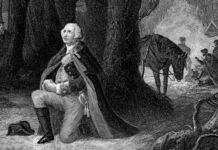When I became a Christian in 1973, I did not know much about the Bible. I went to a Catholic School through the fifth grade and church every Sunday, but I was only able to pick up some basic knowledge about Christmas and Easter.
My first reading of the Bible was for knowledge. What does the Bible say? That’s always the first step. But I felt like the Ethiopian Eunuch when Philip asked him, “Do you understand what you are reading?” And he said, “How can I, unless someone guides me?” (Acts 8:30–31). By the next year, I was headed to seminary. This is not something I would recommend for someone who was only a Christian for little more than a year.
While there, I picked up the book Matthew 24 written by J. Marcellus Kik in 1948 and republished by Presbyterian and Reformed some years later. It was in that book that the principle of using the Bible to interpret the Bible was my guiding methodology. In the 1970s, The Late Great Planet Earth was huge bestseller selling tens of millions of copies. Its hermeneutical model has been described as “newspaper exegesis.”
People practice newspaper exegesis when they mistakenly take biblical prophecy as describing what is happening right now in the news. They read Scripture through the lens of the news. Suddenly the president is the anti-christ. Computer chips are the mark of the beast. Helicopters are locusts.
Newspaper exegesis is nothing new. Ancient Hebrews failed to find Jesus in their prophets. First-century Jews thought their Messiah would end Roman rule. People were running around saying, “I am the Christ.” (Source)
Prophecy isn’t the only topic where newspaper exegesis is practiced. Many Bible scholars tend to look outside the Bible to help with interpretation. This isn’t all bad, but this approach often overshadows the “compare-Scripture-with-Scripture” approach. We should always work to search the Scriptures to determine why a writer uses a certain type of language, illustration, historical example, etc. We should mine the Bible for everything it offers on what we are studying.
One person who has worked hard to implement this approach is my friend Jerry Bowyer. Jerry is an American economist, author, and columnist who most recently has specialized in what Jesus said about economics related to social justice. There has been a lot of ink spilled and keys pressed on what Jesus said and meant when it comes to economic matters. I’ve read a lot of them. Many of them are very good. Jerry’s approach is to unpack the cultural, political, and geographical setting of when economic matters are discussed even with passages that do not jump off the page screaming “economics.” I’ve never read anyone discuss “The Economic Philosophy of the Virgin Mary,” but Jerry does. It’s a real eye-opener.
The following is an excerpt from The Maker Versus the Takers: What Jesus Really Said About Social Justice and Economics published by Fidelis Books (2020) on the subject of the Rich Young Ruler, a section of Scripture that is often used to attack free market economics. A closer look at Jesus’ confrontation with the “ruler” (an important word) is fascinating reading when understood contextually.
Jesus’s confrontation with the rich young ruler is probably the most cited episode in the Gospels on the topic of wealth. Unfortunately, it is often cited by people who want to use it as a cudgel in their own ideological war against the market economy and in favor of centralizing more power in the state.
As I mentioned in the introduction to this book, years ago when I hosted a daily radio program, a leftist listener called my show and tried to use this passage from the Gospels to attack me for my free-market views. She quoted (actually misquoted) that passage as saying, “It is easier for a camel to go through the eye of a needle than for a rich man to go to heaven.” That is a common misquote. The passage doesn’t say anything about going to heaven. It mentions entering the kingdom of heaven, which is a different matter.
But aside from that quibble, the use of that passage as an ideological weapon in the leftist cause is a serious misreading of the passage. Jesus offered that statement as a commentary on a confrontation He had with a man of the state, a rich young ruler. Right off the bat, it seems quite unlikely Jesus intended His words to be used to grow the power of the state when the man He had just confronted lived off his access to the power of the state.
Let’s take a closer look at the encounter:
And rising up, He went from there to the region of Judea.…He was setting out on a journey, a man ran up to Him and knelt before Him, and began asking Him, “Good Teacher, what shall I do to inherit eternal life?”—Mark 10:1, 17
Did you notice where this took place? It occurred almost immediately after Jesus entered Judea. Anyone who has read this far in the book will find it almost impossible to ignore the importance of this detail. Jesus (as well as Mary and, we’ll see later, Jesus’s brother — and Mary’s son — James) conforms with a clearly discernible pattern when it comes to offering economic commentary when in Judea, particularly in the environs of Jerusalem.
As I’ve said, Jesus does not confront wealthy individuals over their wealth while in His native Galilee (although He does confront His neighbors over other issues there). But as we see in this passage, almost immediately upon entering Judea, all that changes, and not coincidentally. This new tone toward the wealthy expressed while in the seat of political power is employed against a man who is explicitly revealed to be connected with that political power. Let’s look at Luke’s account:
And a certain ruler questioned Him, saying, “Good Teacher, what shall I do to inherit eternal life?” — Luke 18:18
What does “ruler” mean in this context? The original Greek says archon, which is the word used to describe a member of a government council. In this particular instance, it implies he was a member of the Sanhedrin. The Sanhedrin was the center of political, religious, and economic power. Sanhedrin members were typically from wealthy and influential families, often priestly, and during Jesus’s time, increasingly Pharisaical. Quite often seats were passed down through the generations, which explains a small and seemingly irrelevant detail of the text: The young man said to Him… (Matt. 19:20).
He was young and a Sanhedrin member, which points to his having inherited his father’s seat on the council along with his land-based (we’ll see that below) income stream.
Let’s take a moment to look at the different emphases in the accounts of the three synoptic Gospels (synoptic refers to the three Gospels — Matthew, Mark, and Luke as opposed to John) describing this event.
Mark’s account does not tell us this man was a ruler. This is probably because that Gospel is considerably less lengthy with less room for detail. In addition, because Mark is almost certainly an early Gospel and written when the Christian movement was more Jewish, it would, consequently, be more Jewish itself. Which implies the man probably was recognizable and therefore needed no introduction. This fits with the fact that Matthew also does not mention the man is a ruler.
Matthew is undoubtedly initially aimed at a Jewish audience and so, once again, the man would be a recognizable social stereotype. This works in the converse case, in which Luke does mention the man was an archon. Luke was a Gentile, and his intended audience was also Gentile. They would be less familiar with the socioeconomic environment of Israel and less able to intuit that this man was a politically connected member of the ruling class; therefore, this audience would need to be explicitly told about his political office.
For more insight into the economic aspects of this encounter, let’s take a closer look at the details of Mark’s account:
…And as He was setting out on a journey, a man ran up to Him and knelt before Him, and began asking Him, “Good Teacher, what shall I do to inherit eternal life?”
And Jesus said to him, “Why do you call Me good? No one is good except God alone.
“You know the commandments, ‘Do not murder, Do not commit adultery, Do not steal, Do not bear false witness, Do not defraud, Honor your father and mother.’”
And he said to Him, “Teacher, I have kept all these things from my youth up.”
And looking at him, Jesus felt a love for him, and said to him, “One thing you lack: go and sell all you possess, and give to the poor, and you shall have treasure in heaven; and come, follow Me.”
But at these words his face fell, and he went away grieved, for he was one who owned much property.
And Jesus, looking around, said to His disciples, “How hard it will be for those who are wealthy to enter the kingdom of God!” — Mark 10:17–23 (emphases mine)
Carefully notice the words and phrases that have been emphasized. Remember how I mentioned that the “enter the kingdom of God” phrasing is often misquoted? It is not “enter heaven”; it’s “enter the kingdom of….”
Matthew’s version used the Hebraism (remember I said Matthew was written for a Jewish audience) “kingdom of heaven,” but Luke used the more universal “kingdom of God.” What’s the difference? You enter the Kingdom of Heaven/God when you repent and follow God and His heavenly ways. Entering the kingdom does not refer to the moment when you die. You enter heaven when you die.
In other words, this observation is about conversion, not the afterlife. It does not in any way imply a rich person who is a follower of Jesus will find it difficult to go to heaven when he dies. Moralists, leftists, and manipulative ecclesiastical money raisers should stop implying that it does.
Now let’s take a closer look at the use of the word translated as “defraud.” At first glance it appears to be a quote from the second half of the Ten Commandments. But when the reader pays closer attention, it becomes obvious this is a variation on the texts of the Ten Commandments. Defrauding is not mentioned in either version of the Decalogue.
This means Jesus added a commandment. Did He mess up His Bible memory verses? Probably not.
What makes more sense by far is He was making a point: This ruler, like most of the rest of the ruling class, was indeed defrauding. Whom were they defrauding? The poor, who were powerless and therefore ill-equipped to protect themselves from being defrauded. That’s why Jesus commands him to give his wealth to the poor: it was taken from the poor.
















